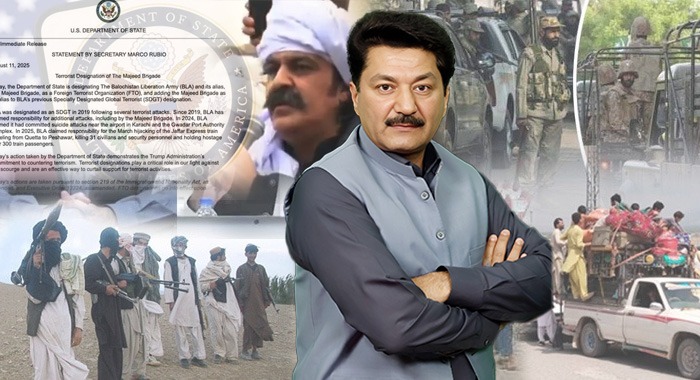The United States’ decision to formally designate the Balochistan Liberation Army (BLA) and its suicide wing, the Majeed Brigade, as Foreign Terrorist Organisations marks a significant, albeit overdue, recognition of the threats Pakistan has long confronted. This move is not just a legal designation; it’s a validation of Pakistan’s consistent position that these groups, propped up by foreign intelligence agencies like India’s RAW, are actively destabilizing its territory and targeting both civilians and state institutions.
This designation did not emerge in isolation. It comes at a time when Pakistan is battling a renewed surge of terrorism, not only in Balochistan but across Khyber Pakhtunkhwa, from Bajaur to Waziristan. Militants regrouping under various banners, whether TTP, BLA, or their splinters, pose a hydra-headed challenge. Pakistan has maintained for years that these are not localised insurgencies rooted in grievances alone. Rather, they are internationally sponsored proxy actors with access to funding, arms, safe havens, and digital propaganda tools. The U.S. decision finally aligns with this ground reality.
Let’s not forget that BLA and Majeed Brigade were not targeting isolated installations. These groups orchestrated high-profile attacks, from the Gwadar port and Karachi airport to the deadly hijacking of the Jaffar Express. Their method of warfare, especially the use of suicide bombers and hostage-taking, mirrors the tactics of internationally condemned terrorist groups. Pakistan’s security agencies have faced not just the tactical complexity of fighting such enemies, but also the international apathy or selective outrage that often accompanied attacks on its soil.
The timing of this move is crucial. Within a span of four days, Pakistani forces neutralized 50 militants in Balochistan’s Zhob and Sambaza regions, areas increasingly being used by TTP and other anti-state actors infiltrating from across the Afghan border. These operational successes are not just tactical victories; they highlight the seriousness of the threat and the capacity of Pakistan to respond decisively — despite internal contradictions and limited international support.
Indeed, internal political clarity is just as important as international cooperation. Statements made in public rallies by government leaders, like opposing military operations, only to later greenlight them in cabinet meetings, send confusing signals to the public and weaken national resolve. Displacement caused by these operations, as currently unfolding in Bajaur, requires comprehensive planning, humanitarian support, and, most importantly, clear communication. A tent alone is not enough. Food, water, medical care, and psychological support must follow. The government cannot afford to fumble its social contract in these vulnerable regions.
Meanwhile, across the border, Afghanistan’s inability or unwillingness to rein in militant groups operating from its territory continues to undermine regional stability. Nuristan, once a tranquil eastern province, has now become a battleground between rival terror factions, some of whom are using military-grade drones. The fact that militant groups are engaging in internal turf wars with such weaponry in Afghan territory raises serious questions about the Taliban regime’s control and credibility. When Pakistan voices concern over the 6,000-7,000 militants and their families taking refuge in Afghanistan, it is not paranoia, it is a strategic reality that the Afghan leadership must face.
The way forward now demands multi-tiered action. The U.S. must translate this designation into tighter financial scrutiny, sanctions, and pressure on any country found harboring or funding such groups. Pakistan must consolidate this diplomatic victory by pursuing these terrorist networks relentlessly, militarily, ideologically, and through stronger narrative-building at home. And regional players, particularly Afghanistan, must realize that terrorism is never contained; it always spills over.
The FTO label for BLA and Majeed Brigade is more than symbolic. It opens diplomatic doors, triggers legal pathways, and legitimizes Pakistan’s long-standing claims on the global stage. But designations alone don’t neutralize threats. They merely expose them. The real challenge now lies in dismantling the ecosystem that allows such groups to thrive, and doing so with national unity, international cooperation, and moral clarity.





